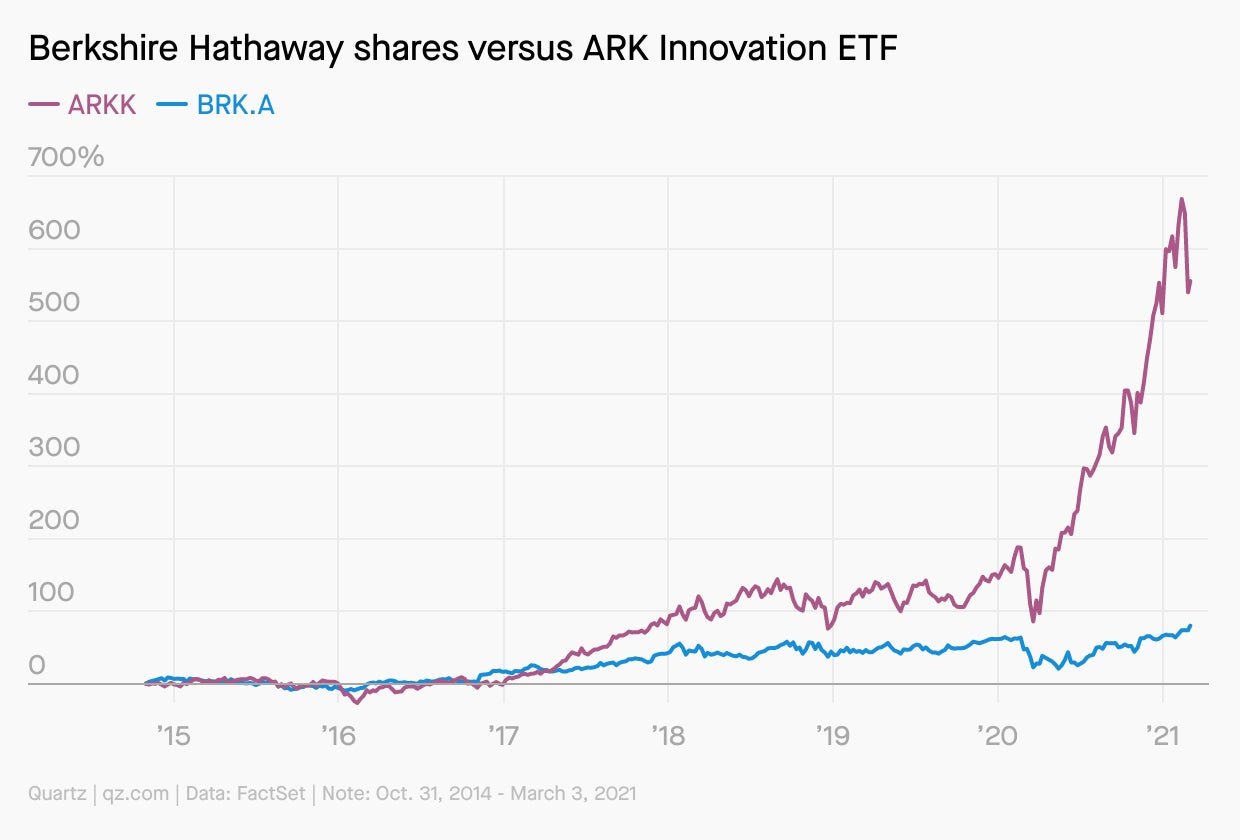Oprah and Megxit, Buffett vs. Wood, wolf dogs
Good morning, Quartz readers!


Good morning, Quartz readers!
Here’s what you need to know
Oprah scored the biggest royal interview in 25 years. Meghan Markle and Prince Harry said the royal palace was unwilling to confront racist coverage of the couple in the British press in an interview that echoed Princess Diana’s raw 1995 broadcast about the state of her marriage.
The US and EU temporarily dropped some retaliatory tariffs. The duties had been placed on wine, cheese, whiskey, and other products to penalize each for illegally subsidizing Boeing and Airbus.
The Chinese hack of corporate email is huge. Hafnium, a group believed to be state-sponsored, compromised tens of thousands of Microsoft Exchange servers, including some used by government agencies.
A Japanese finance giant will pull out of Hong Kong. Yoshitaka Kitao, CEO of SBI Holdings, said “without freedom, there is no financial business.”
Oil prices rose above $70. The spike came after Saudi Arabia said some of its oil facilities were damaged by drone and missile strikes by Houthi rebels on Sunday.
Switzerland voted to ban full face coverings in public. The “burqa ban” measure, which passed narrowly in a referendum, carves out exemptions for places of worship, and for health and safety reasons.
Beijing told the US to mind its own business. Foreign minister Wang Yi called for an end to “unreasonable restrictions”—a likely reference to blacklists of Chinese companies—if the US wants to improve ties.
India might allow some cryptocurrency after all. Its finance minister promised to “keep a window available” for experimentation, instead of a complete ban, as the country drafts digital currency rules.
What to watch for
The Disneyland theme park could reopen as early as April 1 as new rules from California health officials in response to the ongoing coronavirus pandemic take effect. April’s opening day would be the first time crowds have descended upon the park since March 14, 2020.
Disney’s parks in Hong Kong, Orlando, Shanghai, Tokyo, and Paris have reopened (and sometimes re-closed, and reopened) throughout the year due to the pandemic, and Disney said it planned to lay off 32,000 workers, primarily working in its Parks and Resorts.
As the most populated state in the US, California has led the country in Covid-19 cases and deaths, with a particularly large surge of cases at the end of 2020. The changes announced by state health officials on March 5 follow a decline in the rate of infections across the US rollout of vaccines, which are now reaching more than 2 million people per day.
Charting the anti-Warren Buffett
Warren Buffett and Cathie Wood are polar opposites when it comes to investing. Each have cult followings—Buffett’s flock to see him at the company’s annual meeting, while Wood’s show their adoration on Twitter and TikTok.

In recent years, the funds managed by Wood, the founder of ARK Invest, have blown away the stock of Berkshire Hathaway, Buffet’s $565 billion conglomerate that owns America’s largest railroad, as well as stakes in everything from Coca-Cola to Chevron.
Wood’s strategy often starts by figuring out the total addressable market of a technology, like battery storage, and then finding companies that can benefit from such a fast-growing area of opportunity. She seeks out what she calls technology platforms, from genome sequencing to blockchain, that can disrupt and transform the economy.
Someone call a doctor!
Covid was bad for pretty much everything. It was great for telemedicine.
Remote interactions with healthcare professionals increased by 54% in the US last year. In a few months, providers in the Johns Hopkins Medicine network went from 70 visits a month to upwards of 90,000 during the pandemic’s peak.
As the pandemic continues to force people to shun in-person visits, venture capitalists have bet on growth, with US investments in telemedicine in 2020 up $1.8 billion from the year before. Even Italian prime minister Mario Draghi highlighted remote medicine’s importance in his first address to parliament, highlighting its presence as a key ingredient of healthcare’s future.
Most tellingly, medical professionals, who have long resisted telemedicine, are along for the ride.
✦ Learn more about how telehealth could become the future of medicine in our field guide. Not yet a member? Try it for a week for free.
Surprising discoveries
Bacteria are effectively immortal. Scientists were able to feed dormant, 100-million-year-old bacteria trapped in sub-ocean sludge and observe them reproducing.
Japan answered Taiwan’s call to order pineapples. China’s ban on the Taiwan-grown fruit has been met with a surge of purchase orders from Japan.
AI can fool facial recognition AI. Microsoft and Amazon’s facial recognition services fell for deepfakes.
What’s the German word for face mask? The pandemic has conjured more than 1,200 new words in German.
This dog is not a wolf. Visitors to the wolf enclosure at a Chinese Zoo were surprised to find a Rottweiler.
Our best wishes for a productive day. Please send any news, comments, pineapple solidarity, and German words to [email protected]. Get the most out of Quartz by downloading our iOS app and becoming a member. Today’s Daily Brief was brought to you by Tripti Lahiri, Mary Hui, Karen Ho, John Detrixhe, Jordan Lebeau, and David Yanofsky.